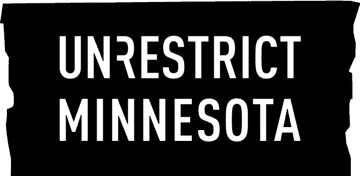As a community-supported public awareness campaign, UnRestrict Minnesota is driven by the solidarity and leadership of its community partners. Together, these advocates, health care providers, lawyers, union members, artists, and concerned citizens are advancing every Minnesotan’s right to access abortion care in our state.
Whole Woman’s Health Alliance (WWHA) is a non-profit organization committed to providing holistic reproductive care for patients, including abortion care and advocacy to eradicate abortion stigma. Benefiting from the expertise of Whole Woman’s Health as its management company and governed by an independent board, Whole Woman’s Health Alliance protects and provides abortion care for all through purposeful litigation, public education, advocacy, and direct service.
Q&A
Below, WWHA Midwest Advocacy Director, Sharon Lau, and Minnesota Advocacy Manager, Karmann Peters, share WWHA’s past successes, the natural connections that led WWHA to join UnRestrict Minnesota, and the work that lies ahead in Minnesota and beyond.
Could you tell us a little bit about your work?
Amy Hagstrom Miller opened the first Whole Woman’s Health clinics to provide compassionate, supportive abortion care and to build access to abortion. As the clinic network grew, Whole Woman’s Health Alliance was founded as a nonprofit to further that work: to shift stigma around abortion through direct service but also through education, training, advocacy, and fundraising. Our mission is to build abortion access in geographic areas that are particularly challenging for abortion access due to licensing and state laws, legal restrictions, or restrictive policies.
For example, we opened our clinic in Indiana when the community there came to us. There had been a clinic in South Bend but it closed when the provider there retired, and so a community group approached Whole Woman’s Health because they knew about our mission and asked if we would consider opening a clinic. We had a building and were in South Bend for three years before we were actually able to see patients because it was so difficult to get a license through the state’s licensing process.
Why is this work important to take on in Minnesota?
Our mission is to provide services in difficult areas—and that is also because we want to have legal standing to challenge restrictive laws in those areas, which is what we’ve been doing in Indiana for a number of years. Part of the focus of our work is purposeful litigation to protect and expand abortion access, which is why it was so obvious that we would join UnRestrict Minnesota and take on Minnesota’s restrictions on abortion.
Whole Woman’s Health (WWH) has a long history in Minnesota. Whole Woman’s Health of the Twin Cities started with the acquisition of the Midwest Health Center for Women in February 2012, followed by the acquisition of the Meadowbrook Women’s Clinic in November 2012. WWH merged the two clinic sites and has operated an independent abortion care practice in Minnesota for the last 10 years. Because of our clinic, there was an opportunity for us to take on building abortion access in Minnesota and in this region.
Why did you join the UnRestrict Minnesota coalition?
We knew we were going to be a partner in the UnRestrict Minnesota coalition because expanding abortion access is part of our mission. The only real coalition organizing we had done before was around Pro-Choice Lobby Day every year, and the structure of this coalition was so different. It included labor, faith-based organizations, and all those other nonprofit organizations that wouldn’t normally be a part of Pro-Choice Lobby Day. It had a totally different effect on us than past coalition organizing and changed the entire landscape in Minnesota.
Another thing that’s been so different about this coalition is that we—meaning the indie clinics in the coalition—are listened to and uplifted. The fact that we share what we need and our coalition partners reciprocate by really listening and platforming what we’ve said we need, instead of just deciding for us, is amazing. And that kind of solidarity is why we’re all in this coalition.
Another unique thing about UnRestrict Minnesota is that the coalition came together for a specific purpose: to expand abortion access in Minnesota. And we succeeded! We’ve seen that success inspire other states, and it’d be amazing to take this further as partners in the coalition by attending conferences and being on panels where we can get the word out about our experience, how it went so well the first time, and how we can replicate it in other states.
What is your vision for achieving full reproductive justice in Minnesota?
Specifically, one of the main things that we’re working on is Medicaid reimbursement, because even though Medicaid covers abortion care in Minnesota, it doesn’t pay providers at a sustainable rate. Some clinics can’t even see Medicaid patients–or they can see them, but they can’t take Medicaid because it’s just not workable. So that’s a huge thing that would significantly help level the playing field for abortion access.
More broadly, we talk a lot about healthy communities in our work: what they look like, how we can support people in our communities from birth to death and everything in between, and how we can build toward a world where everyone’s needs are met, where people can raise their kids in an environment that is safe and healthy, and where we all have bodily autonomy. And reaching that vision doesn’t just mean that we have our own leadership agenda as UnRestrict Minnesota, but that we are also supporting the bigger Reproductive Justice agenda; even if we aren’t necessarily working directly on all these other things, we’re in solidarity with people doing that work.
How can people get engaged with your work?
On the Whole Woman’s Health Alliance website, there is a “How You Can Help” tab that offers ways to tap into community in all of the states where we work. We hold Abortion 101 trainings where folks can come and tour our clinic and learn about how the abortion care process actually works. We find that it really helps to give people grounding to talk about abortion and feel more comfortable and empowered through knowledge.
Just talking about abortion is a big thing that people can do: posting on social media, talking to their friends and family, writing letters to the editor, voting, etc. All of that might not be stuff that is specific to the clinic, but it ultimately impacts the work. People can also fundraise or gather donations. They can host house parties if they want to do small donation gatherings, or they can put together abortion after-care kits and donate them to the clinic.
Recently, people have also been asking us whether they can house people or drive people to their appointments. And what we say is that for driving, there are certain rules and you have to go through a process. It’s the same with clinic escorting: you have to go through the training and be vetted. There are organizations that have been doing this work for years, and are dedicated to continuing this work for a long time. We would encourage people to follow their lead: what kind of support do they ask for? What are their volunteer opportunities? How do they articulate their own needs?
Really what is most helpful is just saying “abortion”–being very vocal in your support, not talking around it, not using a euphemism like “we’ll help them go camping” or whatever, but just breaking the stigma. Abortion isn’t anything that should be hidden; 1 in 4 birthing people will potentially go through this! Let’s have adult conversations about essential health care.


